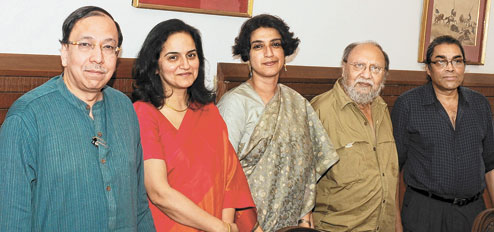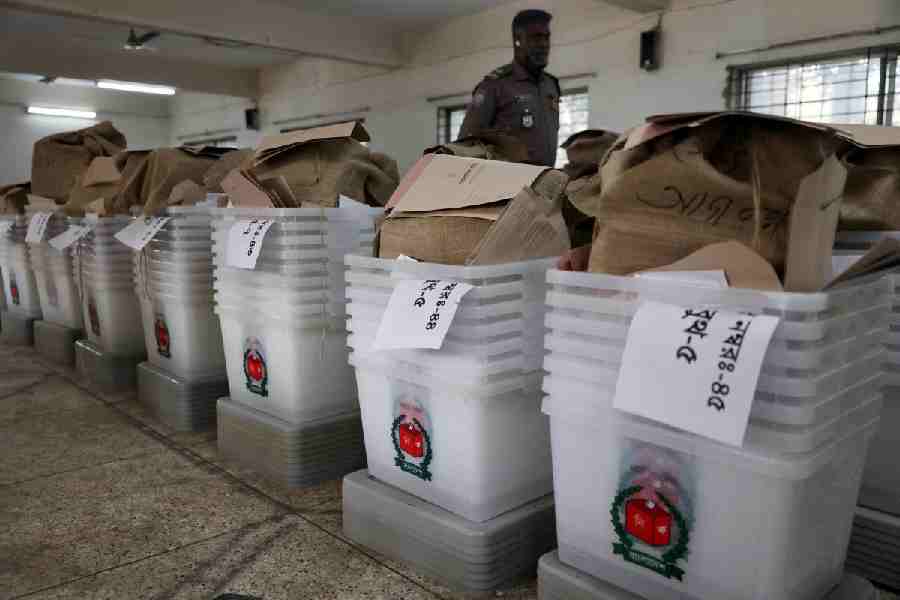 |
| (From left) Speakers Sugata Bose, Nayanjot Lahiri, Ananya Vajpeyi, Ashis Nandy and Shubhashis Gangopadhyay at the Bengal Club panel discussion. Picture by Pradip Sanyal |
Thomas Macaulay, the dedicated apologist of the British Raj, had justified the imposition of British rule on India by arguing about the ‘strangeness’ of the country. In India, he said, “the Empire is itself the strangest of all political anomalies... that we should govern a territory ten thousand miles from us, a territory larger and more populous than France, Spain, Italy and Germany put together... a territory inhabited by men differing from us in race, colour, language, manners, morals, religion”.
With time, the Empire was replaced with a democratic government, but it continued to be ‘anomalous’, ruling over, as it did, an astounding variety of people with widely different social, cultural and linguistic identities. Yet this democracy has thrived for more than 65 years.
In 2013, as India awaits the general elections due next year, while being buffeted with dire threats of divisions, separatism and communalism from every corner of the country, it is time to reassess the idea of India, to reflect on what holds together a nation of more than a billion people. The fourth annual panel discussion of the Bengal Club, held in association with The Telegraph on Friday, did precisely that — it debated over the notion, “The idea of India is irrelevant”.
With Parliament as background prop, eminent personalities from the fields of academics, history, economics, archaeology and sociology talked with the passion of conviction, urged on by the moderator, Rudrangshu Mukherjee, the opinion editor of The Telegraph who is himself an author and a historian.
Nayanjot Lahiri, specialist in Indian archaeology, was the first speaker. She traced back the idea of India to Mauryan times, when Ashoka spoke to his subjects spread over far-flung areas in one voice from his stone edicts, communicating a message of tolerance and mutual respect that must have helped bring the people together.
The next panelist, author and social psychologist Ashis Nandy, brought the audience back to contemporary times as he emphasised how the idea of a ‘desirable’ society has led us to give credence to an imposed concept of India that is a negation of the diversity we have lived with so long.
Taking up Nandy’s point, Mukherjee asked Ananya Vajpeyi, author of Righteous Republic and a columnist with The Telegraph, whether the founding fathers of the nation were also responsible for this destruction of diversity. Vajpeyi elaborated on these great men’s vision of India born of “deep reflection and ‘experiments with truth’” that, while looking back to the past, also incorporated Western ideals. For her, their legacy, however flawed, gives us a reference point from which we can judge how far our present ideas have changed — which is necessary to create a new repertoire.
The economist, Shubhashis Gangopadhyay, had a completely different take on the issue. He said that in a globalised world, with the market stretching across continents, the boundaries of nation states are bound to collapse. This, while doing away with persistent evils such as wars, will also make the idea of India irrelevant.
The scholar and academician, Sugata Bose, rounded up the discussion by making the all-important distinction between the idea of India — which can never lose its relevance — and the idea of the postcolonial nation state created in 1947 where the State becomes a centralised monolith — which is “obsolete: the sooner we bury it the better”. Citing the works of early nationalists like Aurobindo and Bipin Chandra Pal, Bose harked back to older ideas of India, of a Bharatvarsha — which had been rejected with the formation of the nation state. A new idea of India must include those alternate visions to bring forth a freer and more flexible union that is stronger than the existing centralised entity.
While realities are notorious for being intractable, ideas are famed to possess the magical power to transform. The discussion held out the assurance that the idea of India is still pertinent, just waiting for bolstering action to become resurgent again.











